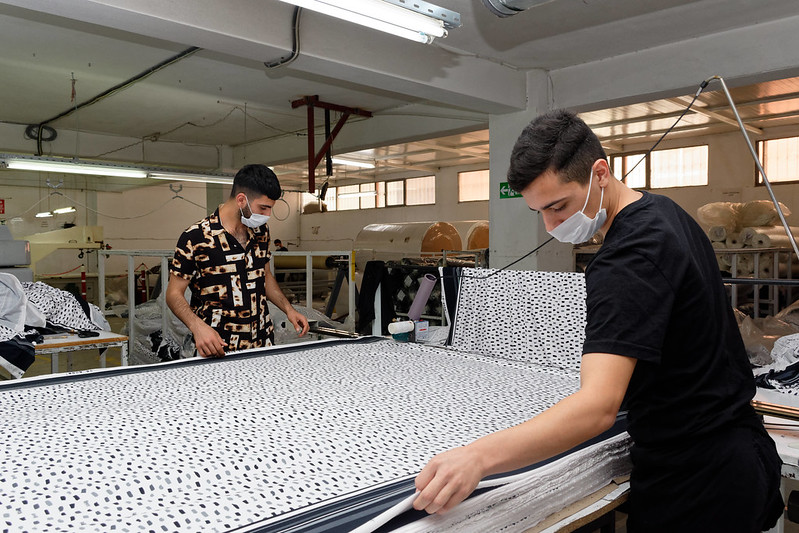Anna-Theresa Unger is a 2020 graduate from Sarah Lawrence College and was the Policy and Communications Intern at IRAP during the 2019-2020 academic year.
As the novel coronavirus spreads throughout the world, individual, organizational, and state-designated financial contributions to refugees, refugee camps, and organizations that provide services to the world’s 26 million refugees have dramatically decreased. Analyzing the pandemic’s short and long-term financial implications for refugees highlights the increasingly uncertain situations that refugees are facing, and the ultimate and comprehensive need for systematic and structural solutions to support refugees.
Since the beginning of 2020 and the proliferation of COVID-19 cases globally, there have been many immediate, direct, and adverse consequences for refugees, beyond the risk the virus poses to their health. In particular, refugees are currently at greater risk of food, water, shelter, and medical shortages, alongside unemployment. For example:
- Uganda, the third-largest refugee-hosting country in the world, is currently facing a serious funding shortfall for food rations for their 1.4 million refugees.
- Refugees located on the islands of Greece are facing new medical challenges, as medical staff are either ill-equipped to conduct certain treatments or are facing translation difficulties due to shortages in staff. On July 30, 2020, the COVID-19 center on the island of Lesbos closed due to newly implemented regulations. This closure causes great concern for the health and safety for the refugees and citizens who currently live in Greece.
- In Bangladesh, due to lockdown measures, there has been an 80% decrease in humanitarian workers within the camps, causing Rohingya refugees to be at risk of food and water shortages.
- In order to support the coronavirus-related emergency response, funds are also being diverted from their previously allocated departments. In Jordan, the camps for Palestinian refugees run by the United Nations Relief and Works Agency (UNRWA) have had to reallocate funds that were originally designated for schools and medical clinics. This has only further reduced the UNRWA’s tight budget (in 2018 the United States, UNRWA’s largest donor, cut their funding to the agency entirely, causing them to run a deficit of over $120 million).
- Funding shortages by the United Nations are causing increased concern for the approximately one million displaced individuals in Yemen who are reliant on UN funding for shelter, food, and medicine. Specifically, the United Nations High Commissioner for Refugees (UNHCR) has said that in order for them to continue providing support, they will need to obtain approximately $89.4 million.
These are only a few of many countries that are currently facing increased challenges due to funding shortfalls for refugees. These cases demonstrate how decreases in funding by the United Nations and other organizations directly impact the running of refugee camps, the provision of daily assistance, and the supply of necessities like food, water, and shelter to refugees themselves.
In addition to the decreases in aid, the coronavirus has also had drastic negative impacts on refugees’ self-reliance and liquidity. In particular, the coronavirus and measures to stem its spread are causing major losses in employment and increases in costs for food and rent. As lockdowns and social distancing measures are forcing business closures, unemployment has risen. Meanwhile, the costs of goods, foods in particular, have increased. As the number of individuals unemployed and the costs for goods increase, the reliance and dependence on aid deepen further. Ultimately, many refugees are being forced to make the difficult choice between purchasing food or coronavirus-related personal protective equipment, like disinfectants. Aisha Ibrahim, a Syrian refugee who currently lives in an informal camp in Bar Elias, Lebanon said, “‘I prefer food; it’s better than disinfectants […] there are some things more important than others.’” Additionally, due to the need to reallocate funds, children and sexual and gender-based violence protection programs, alongside formal and informal educational programming, are being put on hold.
While the immediate financial consequences of the coronavirus are clear, the comprehensive and long-term implications are challenging to predict. Currently, however, we can expect to see the immediate impacts continue and exacerbate. In particular, due to the current trajectory of funding decreases, rise in unemployment, and increasing costs of goods, refugees are expected to experience extensive and deepening economic insecurity. Concurrently, refugees will face worsening food insecurity and increases in malnutrition.
Ultimately, these immediate and longer-term financial implications of COVID-19 for refugees demonstrate the crucial need for long-term structural solutions to support refugees. This pandemic shines a light on the fragility of much of the overarching support systems for refugees – but it also highlights where we can strengthen those systems to sustainably empower people who have been displaced from their old homes but are ready to contribute to their new ones. In addition to increasing refugee resettlement goals in the United States and elsewhere, we must also ensure that wherever refugees currently are, they are included in pandemic relief measures and afforded legal status and protections that empower them to meet their basic needs and work towards their future.




Comments are closed.